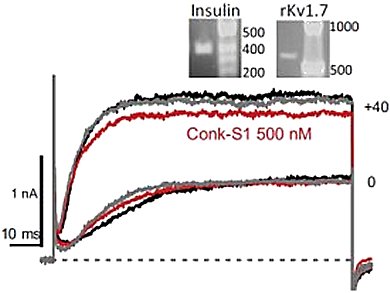The cone snails are predators of the sea. They capture fish by injecting a venom into the prey that consists of a cocktail of different substances. The single components of the snails’ venom, conopeptides, are known for their extraordinary pharmacological properties and potential. One example is Ziconotid (Prialt), a conopeptide that is prescribed as a pain medicine.
Heinrich Terlau, Universities of Kiel, Germany, and colleagues examined the venom of the cone snail Conus striatus. They were able to prove that a certain peptide (Conkunitzin-S1) alters the release of insulin in the pancreas cells.
Patients with type 2 diabetes suffer from an excessive sugar level or hyperglycaemia. The newly discovered substance binds to a specific potassium channel in the pancreas cells and leads to a temporaryly increased release of insulin but only if the blood sugar level is raised.
Following oral glucose tolerance tests on rats, the scientists found that Conkunitzin-S1 does not lead to hypoglycaemia. In other words, the typical side effects of some conventional type 2 diabetes medications do not occur.
- Block of Kv1.7 currents increases glucose-stimulated insulin secretion,
Rocio K. Finol-Urdaneta, Maria S. Remedi, Walter Raasch, Stefan Becker, Robert B. Clark, Nina Strüver, Evgeny Pavlov, Colin G. Nichols, Robert J. French Heinrich Terlau,
EMBO Molec. Med. 2012.
DOI: 10.1002/emmm.201200218
EMBO Molecular Medicine, one of the highest cited journals in the biomedical sciences, is now a fully Open Access journal.




